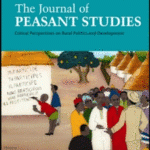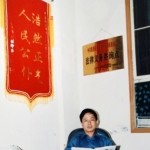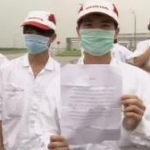
Just published in the latest issue of the electronic journal Journal of World Systems Research, “The Long Twentieth Century and Barriers to China’s Hegemonic Succession” by John Gulick (i.e., yours truly). The (very long! and a trifle dated) article is a critical exegesis of Giovanni Arrighi’s landmark (and now, 17 year-old) book, from the perspective of how it adds to (and to a lesser degree, inhibits) our current understanding of China’s prospective (and I stress “prospective”!) global hegemony. Some of its more relevant and timely elements include: 1) an argument as …

The Journal of Peasant Studies (JPS) has published during the past couple of years several cutting-edge articles on (trans)national agrarian movement politics, food sovereignty and La Via Campesina. Several of these articles can be downloaded free of charge from the journal website until 31st March 2011.

Against the backdrop of Liu Xiaobo being awarded the 2010 Nobel Peace Prize, this issue of CLNT highlights the case of Zhao Dongmin – a labor lawyer and Maoist who on 25 October 2010 was sentenced to three years in prison for applying to set up a workers’ organisation to monitor the privatization of state enterprises and alert the authorities about cases of corruption.

Summary of Aufheben’s two-part article “Return of the Crisis,” highlighting the parts about China and asking some questions.
They argue that the financial crisis of 2007-8 “was caused neither by an accident due to misguided policy, nor… an underlying crisis of stagnation of the real accumulation of capital,” but rather “an oversupply of loanable money-capital within the global banking and financial system that has arisen since the late 1990s. This in turn has been the result of developments in the real accumulation of capital – such as the rise of China, the take-off of the ‘new economy,’ and the continued liquidation of the ‘old economy’ – that have been central to the long upturn.”
They tentatively conclude that “the nature and significance of the financial crisis is not that of a decisive turning point leading to an economic downturn or the end of neoliberalism, as many have supposed, but more of a point of inflection pointed to a new phase in the long upturn.” In a footnote they add, “The crisis could be seen as an earthquake caused by the shifting tectonic plates of global capital accumulation as the centre of accumulation gradually shifts away from the USA and the old advanced capitalist economies towards China and Asia”…

China Strikes is a great new site that maps labor unrest across China. It is easy to add strike reports to the map, and anyone can do that.
http://chinastrikes.crowdmap.com/
About This Site:
The purpose of this site is to track strikes, protests and other collective actions by Chinese workers to defend their rights and interests. We hope that over time the site will serve as a resource to those wishing to better understand and support the labor movement in China.
The categories we use for strikes are based on the type of …

Translation of an autobiographical essay by Tang Shui’en, mainland left-libertarian musician and activist, recounting his path from childhood in 1980s rural Hubei to participation in Wuhan’s pioneering punk scene since the late 1990s, interaction with overseas radicals, and experimentation with independent media and an “autonomous youth center.” Written in early 2009 for a forum on social space among the generation born in the 1980s, organized by the Shao Foundation. “Among the common masses, how many of us are aware of the oppressive forces that push us to society’s margins? Apart from a small minority, most people - even if at every moment they feel discomfort - are unable to determine the source of this pain…”